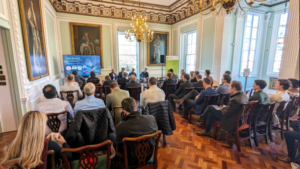
Digital Transformation: What the public sector needs to consider in 2021
It was an eventful 2020. And 2021 is expected to be equally tumultuous as we continue to grapple with the Covid-19 pandemic and deal with life outside the EU.
But amongst this uncertain backdrop, how can the public sector accelerate its digital transformation journey?
Here, some members of our leadership team give their views on what government needs to consider in the coming year.
Empower your teams
– Ainga Pillai – Founder and CEO
“I think Covid and EU exit will both speed up digital transformation in the public sector. To enable that to happen at pace, government organisations really need to empower their people.
“Having an agile mindset is key to this – being flexible, open to change and adaptable. They should prioritise people ahead of processes and tools and create an environment to help their staff make their own choices.
This will motivate them and help them respond to change better.
“For example, we introduced the ‘missions’ way of working to empower teams. We’ve used this methodology to help government departments understand their users’ needs and collectively design and build services that best achieve the desired outcome.
“This approach of trusting the team to explore and innovate on solutions to achieve set goals is particularly suited for remote working.
Even if we go back to some sort of normality, flexible working will now be the norm. So it’s important to find ways of working that gives staff a greater sense of ownership and job satisfaction, which we’ve seen means better results.
“This will ultimately help government deliver on its levelling up agenda while delivering great digital services.”
Build services and internal capability
– Andrew Hawkins – Head of Marketing and Sales
“Covid is having a huge impact on the economy and people’s physical and mental wellbeing. Organisations will play a big part in addressing these issues and will want to show how they are adding value to society.
In fact, it’s something government is already asking suppliers to evidence in the procurement process.
“Government organisations themselves will be forced by Covid to expedite their digital progression. The rapid pace of technology and the widening digital skills gap means that they have to deliver and continuously upskill their people and ensure that their customers, UK citizens, have the required digital skills.
“As government organisations build their internal capability, they should seek external partners that not only provide specialist support in building services but also help them address the internal skills gap.
“Aside from Covid, there’s the post-Brexit situation to contend with. Government will need to create and communicate new policies, which means the rapid development of guidance and digital services for businesses and the wider public.
“It’s another area where experienced technology partners can play a role in helping government create and sustain these services.”
Service design in the public sector
– Steven Maclellan – Head of Product
“I think the focus on service design in the public sector will continue to sharpen. This will allow organisations to really understanding the goals users are trying to achieve and their motivations for wanting to achieve them.
“These goals are increasingly cross-department (e.g I want to grow my business internationally) … and as we’ve always said, people shouldn’t have to be an expert on the structure of government to get stuff done!
“The tools and techniques of service design allow us to join up the individual interaction into something that makes more intuitive sense to a user and their context. This will require process and for that to be made available seamlessly across departments, with the associated policy and consent considerations.
“I also think that our attention on security and minimising the risks of online harm have heightened due to remote working, learning and living!
“These trends will continue and hopefully see benefits in making online environments safe and fair for all.”
Investing in automation
– Derek Hulley – Head of Engineering
“The drive towards greater automation in government has accelerated in recent years. And due to Covid and post-Brexit pressures, the case for automation becomes even more pressing.
“But to do automation well, the public sector needs to resource its teams appropriately. Investing in specialist skills upfront has significant benefits.
“For example, in many teams, the platform and code automation capabilities are not matched by test automation capabilities.
“There’s a risk that the more rapid development of features may exceed the capacity of QA individuals to write automated tests — or worse still, manually test changes.
“This is exacerbated by Agile delivery teams building new environments and deploying products automatically.
“To mitigate this, organisations need to treat quality in the ‘Definition of Done’ right from the start.
“Appropriately resourcing the team means a specialist test engineer can automate and direct testing at all levels in the early stages of a project.
“The responsibility to contribute to the automated testing lies with the entire team but the test specialist ensures that the tools are used correctly and updated appropriately.”
Related content
-

From ScanApp to Lego demos — What you need to know about Security & Policing 2025
-

Truth, trust and transformation — 4 key takeaways from Zaizi’s AI in government event
-

Paris AI summit: Navigating the AI landscape and how SMEs can help UK government
-

Border Force wins Global Customs Innovation Award for ScanApp — a solution Zaizi helped build
